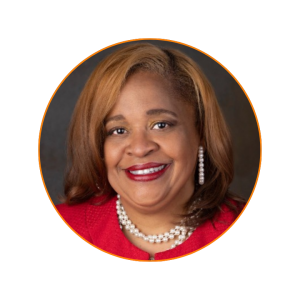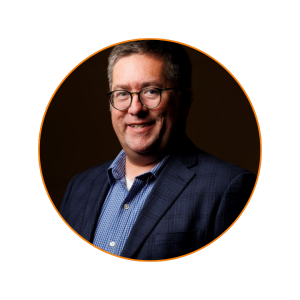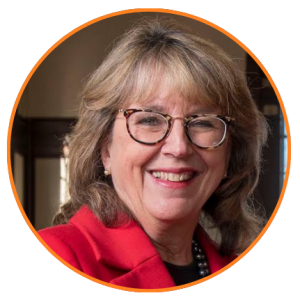Fueling Creativity in Education
Episodes

Tuesday Feb 25, 2025
Tuesday Feb 25, 2025
Sign up for our weekly newsletter here!
How can teachers move from a "deficit mindset" to a "dynamic mindset" when recognizing creativity and intelligence in diverse learners?
In this episode of the Fueling Creativity in Education Podcast, hosts Dr. Cyndi Burnett and Dr. Matthew Worwood engage in a rich dialogue with Dr. Erin F. Floyd, a renowned scholar specializing in gifted education, diversity, equity, inclusion, and social justice. Dr. Floyd, who serves as the Director of Training and Partnership Development for the Consortium for Inclusion of Underrepresented Racial Groups in gifted education, discusses the historical and ongoing challenges of identifying and supporting gifted students, particularly those from underrepresented populations. Drawing from her own personal journey and extensive professional experience, Dr. Floyd explores how systemic changes and a more inclusive approach can enhance the identification process and lead to greater racial equity within gifted education. The conversation takes a deep dive into the importance of moving from deficit thinking towards dynamic thinking, emphasizing the need for a collaborative effort involving multiple stakeholders to ensure that all high-ability students receive appropriate educational opportunities.
Throughout the episode, Dr. Floyd highlights various strategies for educators to more effectively recognize and nurture giftedness in students from diverse backgrounds. She shares insights into the historical context of gifted education, including the impact of the eugenics movement and the importance of multiple criteria in identifying gifted students. With a focus on real-world application, Dr. Floyd discusses her development of online learning modules designed to train educators on recognizing gifted behaviors among minority students. As the conversation wraps up, Dr. Floyd shares her vision for the future of gifted education, calling for a more uniform, equitable policy across the nation and the inclusion of gifted education training in teacher preparation programs. Listeners will walk away with a deeper understanding of the intrinsic value of inclusivity in education and be empowered to advocate for necessary changes that uphold the diverse needs of gifted students.
About Dr. Erinn F. Floyd: Founder/CEO of Equity and Excellence in Education, LLC, provides culturally relevant professional learning and advocacy for educators, organizations, parents, and students. Special Populations in Gifted Education and Culturally Responsive Teaching and Leading are online badging courses for educators of all content areas/levels. Dr. Floyd many roles over 32 years include classroom teacher, Gifted and School Improvement Specialist, District Gifted Education Coordinator, Assistant Principal, Director of Professional Learning for NAGC, and State Director of Gifted Education for the Alabama Department of Education. She has served as lecturer and professor at Texas State University, The University of Maryland, The University of Georgia, and Alabama State University.
Eager to bring more creativity into your school district?Check out our sponsor Curiosity2Create.org and join their Creativity Network for Educators at Curiosity2Connect!Check out our Podcast Website to dive deeper into Creativity in Education!For more information on Creativity in Education, check out:Matt's Website: Worwood ClassroomCyndi's Website: Creativity and Education

Tuesday Feb 11, 2025
Exploring Creativity, Metacognition, and Gifted Education with Dr. Jeb Puryear
Tuesday Feb 11, 2025
Tuesday Feb 11, 2025
Sign up for our weekly newsletter here!
Welcome to an exciting new episode of the Fueling Creativity in Education Podcast as we kick off season 10 with a compelling mini-series on diversity, creativity and gifted education, recorded live at the 2024 National Association for Gifted and Talented Conference in Seattle, Washington. In this episode, our hosts, Dr. Cyndi Burnett and Dr. Matthew Worwood sit down with Dr. Jeb Puryear, an associate professor at the University of Montana. Dr. Puryear imparts his extensive knowledge on the intersection of creativity, talent development, and education. They delve into how creativity research can help address systemic inequities in education and explore intriguing topics such as divergent thinking and creative metacognition, providing invaluable insights for teachers endeavoring to integrate creativity into their classrooms effectively.
Listeners will gain a deeper understanding of ways to contextualize creative assignments for students, linking them to real-world problems and encouraging students to develop a capacity for evaluating ideas critically. The conversation also covers the challenges of equitable education for gifted students and explores intervention strategies rather than relying solely on identification practices. Dr. Puryear emphasizes the importance of recognizing and nurturing creativity in students and teachers alike, and presents an array of strategies to empower educators in fostering a more inclusive and innovative learning environment. Tune in to explore these pivotal themes and to glean inspiration from Dr. Puryear’s creative educational experiences and insights, aimed at transforming how we approach gifted education and creativity in K-12 settings.
About Dr. Jeb Puryear:
Dr.Jeb Puryear is an Associate Professor of Gifted Education at the University of Montana and a former Research Associate at the National Center for Research on Gifted Education. Additionally, he has spent two decades as a teacher and educational administrator. Jeb is an active member of NAGC networks, current chair-elect of the Research & Evaluation network, and routinely serves the gifted education community through editorial work for journals and as a conference proposal reviewer. Jeb has had his work published across top outlets in both the gifted education and creativity fields. His research interests center on creativity, underserved populations in gifted education, and the psychology of talent development.
Eager to bring more creativity into your school district?Check out our sponsor Curiosity2Create.org and join their Creativity Network for Educators at Curiosity2Connect!
Check out our Podcast Website to dive deeper into Creativity in Education!
For more information on Creativity in Education, check out:
Cyndi's Website: Creativity and Education
Matt's Website: Worwood Classroom

Tuesday Jul 12, 2022
How to Engage, Inspire, and Promote Creativity with Dr. Joseph Renzulli
Tuesday Jul 12, 2022
Tuesday Jul 12, 2022
How can we inspire and hold space for gifted and talented kids to express their creativity?
In this episode of the Fueling Creativity in Education podcast, Dr. Cyndi Burnett and Dr. Matthew Worwood speak with Dr. Joseph Renzulli, a world-renowned leader and pioneer in gifted education, creativity, and gifted teaching strategies. Joseph is here to share insights from his research along with why we should care about the spectrum of giftedness in our society.
Listen in to learn Joseph’s take on the relationship between giftedness and creativity, how to bring more creative giftedness into the classroom, and the greatest barriers to us increasing the number of people reaching their creative potential within their field. He also talks about the Renzulli Learning system, how it works, and how it’s benefitting thousands of educators across the world.
“Training teachers is the key to so much of this and, of course, there has to be some administrative support for it.” – Dr. Joseph Renzulli
Plus, Joseph breaks down his “Creative Idea Generator” method, how to apply “curriculum compacting” to accommodate gifted students, and how parents can facilitate creativity and learning outside of the classroom. Then, he highlights his biggest fear regarding the future of gifted education and where we need to focus our energy in the coming years.
Are you an educator who wants to learn and do more in the field of gifted education? Tune in to learn how to participate in the virtual Confratute learning experience held in July at the University of Connecticut!
Joseph’s Tips for Teachers and Parents:
Work with the school library to set up a section dedicated for “how-to” books.
Utilize basic ideas that are quick to read/learn about. Long lectures or videos are going to lead kids to lose interest.
Ask open-ended questions every single day.
Resources Mentioned:
Article: What Makes Giftedness?: Reexamining a Definition
Learn more about Renzulli Learning
Listen to the episode with Dr. Sally Reis
No Child Left Bored by Sally Reis
Register for Confratute at UConn!
Subscribe to our monthly newsletter!
Eager to bring more creativity into your home or classroom?
Access various creativity resources and tools & listen to more episodes of The Fueling Creativity in Education Podcast by visiting www.CreativityandEducation.com.
What to learn more about Design Thinking in Education?
Do you want to build a sustained culture of innovation and creativity at your school? Visit WorwoodClassroom.com to learn how Design Thinking can promote teacher creativity and support professional growth in the classroom.
Have a question? Email Dr. Burnett and Dr. Worwood at questions@fuelingcreativitypodcast.com!
You can also find The Fueling Creativity in Education Podcast on Apple Podcasts, Spotify, Audible, and PodBean! Make sure to rate, review, and share the podcast if you enjoy it!
About Dr. Joseph Renzulli:
Dr. Joseph Renzulli is a leader and pioneer in gifted education and applying the pedagogy of gifted education teaching strategies to all students. The American Psychological Association named him among the 25 most influential psychologists in the world. Dr. Renzulli received the Harold W. McGraw, Jr. Award for Innovation in Education, considered by many to be “the Nobel” for educators, and was a consultant to the White House Task Force on Education of the Gifted and Talented.
Joseph S. Renzulli is Professor of Educational Psychology at the University of Connecticut, where he also served as director of the National Research Center on the Gifted and Talented. His research has focused on the identification and development of creativity and giftedness in young people and on organizational models and curricular strategies for total school improvement. A focus of his work has been on applying the strategies of gifted education to the improvement of learning for all students. Dr. Renzulli currently leads the Renzulli Center for Creativity, Gifted Education, and Talent Development.
Follow Renzulli Learning on Instagram

Tuesday Mar 15, 2022
Discussing Neuroscience and Creativity with Dr. Anna Abraham- Part Two
Tuesday Mar 15, 2022
Tuesday Mar 15, 2022
In this episode of the Fueling Creativity Podcast, Dr. Cyndi Burnett and Dr. Matthew Worwood speak with Dr. Anna Abraham, an E. Paul Torrance Professor in UGA’s Department of Educational Psychology and Director of the Torrance Center for Creativity and Talent Development at UGA’s Mary Frances Early College of Education.
In part two of this two-part interview, you’ll gain insight into the work of E. Paul Torrance, the father of creativity and education, along with the work that Anna is now doing within the Torrance Center for Creativity and Talent Development. She shares her vision for the department and how she intends on building upon the work of Torrance, particularly via The Torrance Festival of Ideas. As the Founding Editor of The Cambridge Elements Series in Creativity and the Imagination, Anna also sheds light on the key insights she’s learned about imagination and wonder.
“If you’ve managed to cultivate wonder in your student, you have done something magical.”
- Anna Abraham
“Being in the College of Education, our role is to be a resource, an educational resource, and part of that is getting people very instrumental together to talk about ideas that are really relevant for the community at large.” - Anna Abraham
Anna’s Tips for Teachers and Parents:
See creativity as not the domain of a few, but a skill that is basic to all of us.
Having recognized that you have this creative ability, think about what it can do for you- not as a way to make money or prove your productivity, but as a way to discover yourself and the power of your own mind.
Don’t stop being creative. Keep at it, even if it’s for a few minutes each day!
About Anna Abraham:
Anna Abraham, Ph.D. is the E. Paul Torrance Professor and the Director of the Torrance Center for Creativity and Talent Development at UGA’s Mary Frances Early College of Education. Her educational and professional training has been within the disciplines of Psychology and Neuroscience, and she has worked across a diverse range of academic institutions and departments the world over, all of which have informed her multidisciplinary focus. She investigates the psychological and neurophysiological mechanisms underlying creativity and other aspects of the human imagination. Her wide-ranging contributions to the field of creativity include theoretical, methodological and empirical advances in the context of basic and applied research. She has penned numerous publications including the sole authored book, The Neuroscience of Creativity (2018, Cambridge University Press), and the multidisciplinary edited volume, The Cambridge Handbook of the Imagination (2020). She is the Founding Editor of The Cambridge Elements Series in Creativity and the Imagination.
Visit Anna's websiteConnect with her on LinkedIn
Resources Mentioned:
Listen to part 1 linked needed
Sign up to join The Torrance Festival of Ideas
Listen to the episode with Natalie NixonListen to the episode with Jeffrey Davis
Subscribe to our monthly newsletter!
Eager to bring more creativity into your home or classroom?
Access various creativity resources and tools & listen to more episodes of The Fueling Creativity in Education Podcast by visiting www.CreativityandEducation.com.
What to learn more about Design Thinking in Education?
Do you want to build a sustained culture of innovation and creativity at your school? Visit WorwoodClassroom.com to learn how Design Thinking can promote teacher creativity and support professional growth in the classroom.
You can also find The Fueling Creativity Podcast on Apple Podcasts, Spotify, Audible, and PodBean! Make sure to rate, review, and share the podcast if you enjoy it!

Friday Dec 17, 2021
Discussing Excellence Gaps and Creativity with Dr. Jonathan Plucker - Part 2
Friday Dec 17, 2021
Friday Dec 17, 2021
It’s easy to have a negative view of testing, but testing does have value in terms of content knowledge acquisition. In part two of this two-part interview, Dr. Cyndi Burnett and Dr. Matthew Worwood speak with researcher and creativity expert, Dr. Jonathan Plucker, about the relationship between gifted education and creativity. Jonathan also speaks on why he believes every school should have a Chief Creativity Officer and what that would look like.
Tune in to learn Jonathan’s approach to testing students, assessing for gifted education programs, and how to identify students who are talented or gifted. He sheds light on why it’s a huge mistake to drive advanced learning and creativity out of our schools. Plus, he shares his thoughts on why educators should be focusing on students with true potential who are underperforming and turning that potential into advanced performance.
“If a student’s performing at advanced levels, I encourage people not to overthink that. Just accept it. Great, they’re working at advanced levels. That’s the goal. How much further can I push this student?... But we have so many students who are not performing at those advanced levels who have the potential to get there and that’s what I’m really concerned about is we tend to look right past those students.” - Dr. Jonathan Plucker
Jonathan’s Tips for Teachers, Administrators, and Parents:
The best way to use teacher involvement is to focus on what they are trained to do: to help students, especially those who aren’t being noticed. If you’re going to be identifying for a talent, don’t use teachers as gatekeepers. Collect all your data and then use teachers as the safety net to catch those whom the administrators missed.
Modeling is incredibly important for creativity. If you run into a problem, have your students/children work with you to solve it.
Creative Articulation: Professional, long-term creators are very good at convincing people that their work is creative. They are also masterful at incorporating feedback and using it to improve their work. Help your students/children learn how to share their creativity and persuade others that their perspective is valuable… at ALL ages.
About Dr. Jonathan Plucker:
Jonathan Plucker is a prominent education policy and talent development scholar, and the inaugural Julian C. Stanley Professor of Talent Development at Johns Hopkins University. He holds a joint appointment at the Center for Talented Youth and School of Education.
His work focuses on education policy and talent development and has been supported by over $40 million in external grants and contracts. Jonathan has published over 300 articles, chapters, and reports. He recently became editor for the Psychological Perspectives on Contemporary Educational Issues series at IAP. His work defining and studying excellence gaps (http://cepa.uconn.edu/mindthegap) is part of a larger effort to reorient policymakers’ and educators’ thinking about how best to promote success and high achievement for all children.
Visit Jonathan’s website
Follow him on Twitter
Book & Publications by Dr. Jonathan Plucker
Resources Mentioned:
Book & Publications by Dr. Jonathan PluckerListen to the episode with Scott Barry Kaufman
Listen to the episode with Sally Reis
Eager to bring more creativity into your home or classroom?
Access various creativity resources and tools & listen to more episodes of The Fueling Creativity in Education Podcast by visiting www.CreativityandEducation.com.
What to learn more about Design Thinking in Education?
Do you want to build a sustained culture of innovation and creativity at your school? Visit WorwoodClassroom.com to learn how Design Thinking can promote teacher creativity and support professional growth in the classroom.
Subscribe to our monthly newsletter!
You can also find The Fueling Creativity Podcast on Apple Podcasts, Spotify, Audible, and PodBean! Make sure to rate, review, and share the podcast if you enjoy it!

Friday Dec 17, 2021
Discussing Excellence Gaps and Creativity with Dr. Jonathan Plucker - Part 1
Friday Dec 17, 2021
Friday Dec 17, 2021
Our last guest of the season features a double expresso with President of the National Association for Gifted and Talented, Dr. Jonathan Plucker. In part one of this two-part interview, Jonathan shares his thoughts on problems with achievement gaps and excellence gaps in education.
“I’m actually fully convinced that in the next 10-15 years, if we prioritize this, we can actually go a long way to solving this problem… and I could not have said that five or six years ago.”
- Dr. Jonathan Plucker
Listen in to gain insight into the connection between academic excellence and creativity later in life, and why there’s never a blank canvas to work with when being creative. Jonathan also shares his candid thoughts on creativity in imaginative play, as well as how we can diminish the harmful impact of poverty on children’s ability to develop imagination.
“The more that students learn, the more information, the more ‘stuff’… that they have at their mental fingertips, the better off they will be as they try to be creative, especially as they move into their careers later in life.”
- Dr. Jonathan Plucker
About Dr. Jonathan Plucker:
Jonathan Plucker is a prominent education policy and talent development scholar, and the inaugural Julian C. Stanley Professor of Talent Development at Johns Hopkins University. He holds a joint appointment at the Center for Talented Youth and School of Education.
His work focuses on education policy and talent development and has been supported by over $40 million in external grants and contracts. Jonathan has published over 300 articles, chapters, and reports. He recently became editor for the Psychological Perspectives on Contemporary Educational Issues series at IAP. His work defining and studying excellence gaps (http://cepa.uconn.edu/mindthegap) is part of a larger effort to reorient policymakers’ and educators’ thinking about how best to promote success and high achievement for all children.
Visit Jonathan’s website
Follow him on Twitter
Book & Publications by Dr. Jonathan Plucker
Resources Mentioned:
Book & Publications by Dr. Jonathan PluckerListen to the episode with Scott Barry Kaufman
Listen to the episode with Sally Reis
Eager to bring more creativity into your home or classroom?
Access various creativity resources and tools & listen to more episodes of The Fueling Creativity in Education Podcast by visiting www.CreativityandEducation.com.
What to learn more about Design Thinking in Education?
Do you want to build a sustained culture of innovation and creativity at your school? Visit WorwoodClassroom.com to learn how Design Thinking can promote teacher creativity and support professional growth in the classroom.
Subscribe to our monthly newsletter!
Follow Cyndi and Matt on Linkedin.
You can also find The Fueling Creativity Podcast on Apple Podcasts, Spotify, Audible, and PodBean! Make sure to rate, review, and share the podcast if you enjoy it!

Friday Oct 22, 2021
Talking Talented and Giftedness with Dr. Sally Reis
Friday Oct 22, 2021
Friday Oct 22, 2021
In this episode of Fueling Creativity, Dr. Cyndi Burnett and Dr. Matthew Worwood interview Dr. Sally Reis, Professor of Educational Psychology at the University of Connecticut, about why teachers need to be more aware of gifted and talented students, including 2e students, and why there’s a big focus on creativity in this field of gifted education. She also offers recommendations on how we can continue breaking down the challenges women and young girls face in STEM education and leadership.
Sally shares her thoughts on why creativity isn’t incorporated into mainstream education curriculums as much as it is for gifted students, as well as her framework for schoolwide enrichment reading and exploration of passions and interests.
We also discuss the beneficial impacts of facilitating creative and productive activities in school, including science fairs and writing books. Then, using the concept of multi-potentiality, Sally addresses parental concerns with navigating their children’s many interests and talents.
“One of the major goals of many gifted education models and programs is the development of students’ creativity so that we will have the next generation of inventors, producers, painters, artists, engineers, high creatives that are doing good work in our society. This type of education benefits the entire globe.” - Sally Reis
Sally’s Tips for Parents & Teachers:
Exposure, exposure, exposure! Take your kids to museums, watch Tedx talks with them, watch good TV and films, expose them to nature, and so much more.
Help your children develop an interest. Good exposure leads to strong interests. Interests may not last, but their capacity to have interests is critical. Having interests makes life better.
Integrate project-based learning. Doing experiments and hands-on projects helps them nurture their creative fire, develop passions, and have fun while learning.
Resources Mentioned:
Schoolwide Enrichment Model: https://gifted.uconn.edu/schoolwide-enrichment-model
Schoolwide Enrichment Model Reading Framework: https://gifted.uconn.edu/semr-about
About Sally Reis: Sally Reis is the Vice Provost for Academic Affairs, a Board of Trustees Distinguished Professor, and a Teaching Fellow in Educational Psychology at the University of Connecticut. She currently holds the Letitia Neag Chair in Educational Psychology. She was a public school teacher and administrator for 15 years, prior to her work at UConn. She has authored more than 250 articles, books, book chapters, monographs and technical reports. She has traveled extensively across the country conducting workshops and providing professional development for school districts on enrichment programs and gender equity programs. Sally serves on the editorial board of the Gifted Child Quarterly, and is a past-president of The National Association for Gifted Children. She is a fellow of the American Psychological Association and was named a Distinguished Scholar of the National Association for Gifted Children.
Connect with Sally:
Connect with her on LinkedIn: www.linkedin.com/in/sally-reis-4304b810
Eager to bring more creativity into your home or classroom?
Access various creativity resources and tools & listen to more episodes of The Fueling Creativity in Education Podcast by visiting www.CreativityandEducation.com.
What to learn more about Design Thinking in Education?
Do you want to build a sustained culture of innovation and creativity at your school? Visit WorwoodClassroom.com to learn how Design Thinking can promote teacher creativity and support professional growth in the classroom.
Subscribe to our monthly newsletter!
You can also find The Fueling Creativity Podcast on Apple Podcasts, Spotify, Audible, and PodBean! Make sure to rate, review, and share the podcast if you enjoy it!